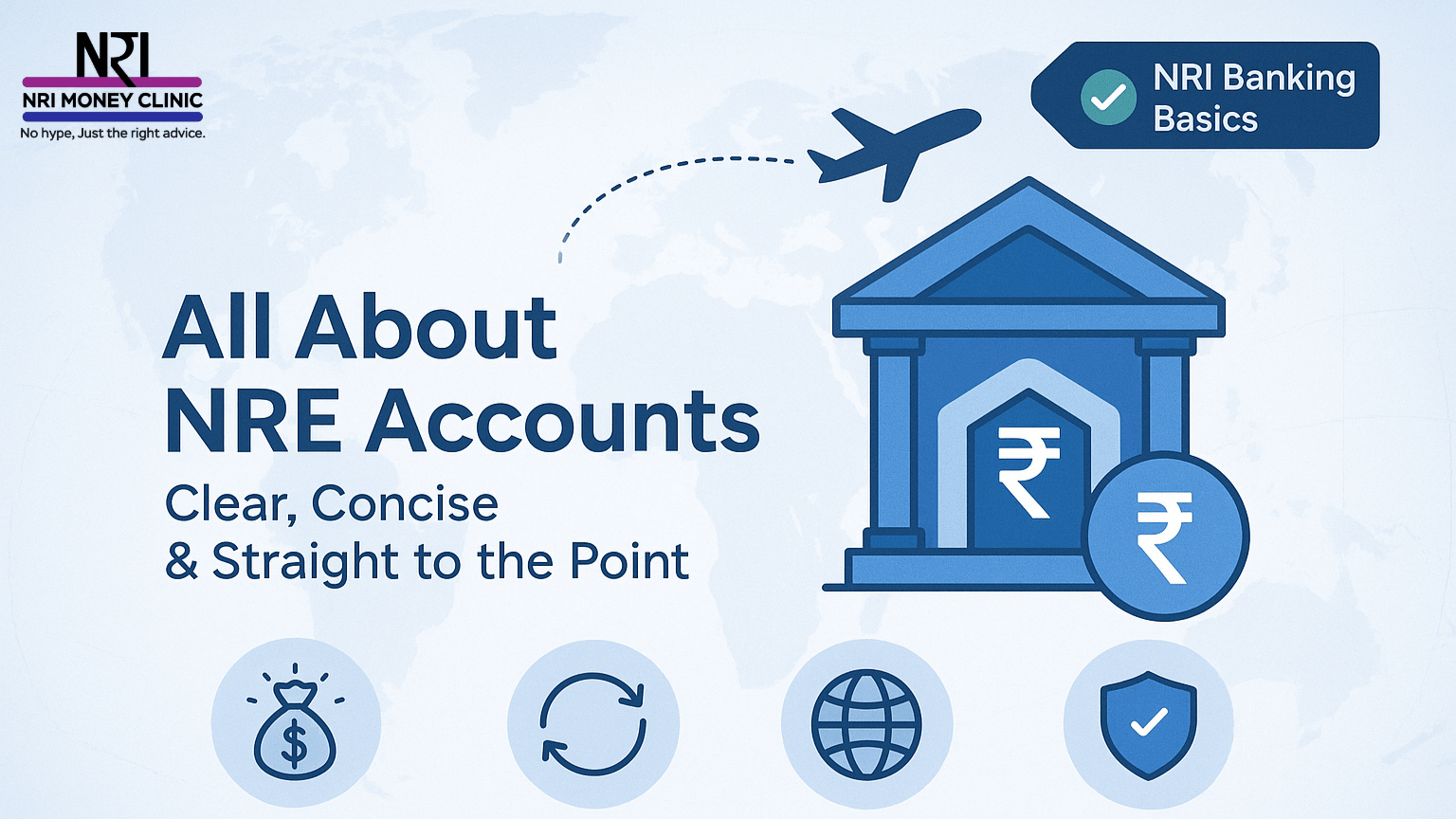For many NRIs, banking in India can feel like a maze.
It’s not the same as resident banking—it comes with its own rules, benefits, and restrictions.
Among the different types of NRI accounts—NRE, NRO, FCNR, GIFT City accounts, and RFC—the NRE account often creates the most confusion. So let’s break it down, step by step.
What Exactly Is an NRE Account?
NRE stands for Non-Resident External account.
It’s designed to hold your foreign earnings in India. Funds are deposited in INR, but the money comes from abroad.
Who Can Open an NRE Account?
Any NRI under FEMA rules
PIOs (Person of Indian Origin) and OCI card holders
Certain foreign nationals with eligible links to India
You can open an NRE account:
Singly – just you
Jointly – with another NRI, PIO, OCI, or even a resident Indian (with a former or survivor mandate—meaning the resident can only operate the account if the NRI account holder passes away)
Types of NRE Accounts
Just like resident accounts, an NRE account can be:
Savings Account
Current Account
Recurring Deposit (RD)
Fixed Deposit (FD)
Note: For NRE fixed deposits, the minimum tenure is one year. No short-term FDs allowed.
How Can You Fund an NRE Account?
You can:
Remit money from your overseas account
Transfer from another NRE account
Credit proceeds from investments originally made from your NRE account
Receive certain Indian incomes (like rent) after paying taxes and providing a Chartered Accountant (CA) certificate
You cannot:
Deposit Indian currency directly
Receive money from a friend or relative in India into your NRE account (they must send it to your NRO account instead)
Using an NRE Account: What’s Allowed?
You can:
Transfer to another NRE account
Pay for property, investments, insurance premiums, or purchases in India
Remit money abroad freely—no RBI permission, no CA certificate needed
Advantages of an NRE Account
Full Repatriation – Move your money abroad anytime without restrictions.
Tax-Free Interest in India – Interest earned on NRE deposits is exempt from Indian income tax. (But remember—your country of residence may still tax it.)
Ease of Joint Holding – Can be held with another NRI or even a resident Indian (with certain conditions).
Disadvantages of an NRE Account
Only in INR – You can’t hold it in foreign currency.
Minimum FD Tenure – At least one year.
Limited Credits from India – Indian income requires tax clearance before it can be transferred into your NRE account.
Scrutiny on Large Transactions – It’s still an Indian account; the Income Tax Department can question suspicious movements.
Common Misunderstandings to Avoid
Salary Credits from Overseas Employers: If your foreign employer deposits directly into your NRE account, it may be taxed in India. Safer route: Receive it in your foreign account or GIFT City account, then transfer it to NRE.
Believing Transactions Are “Untouchable”: NRE accounts are subject to Indian banking and tax laws; keep your documentation clear.
Not Keeping Proof of Investment Source: For insurance or mutual fund redemptions, maintain proof that the purchase was funded from your NRE account.
For New NRIs: When to Open an NRE Account
You cannot convert a resident savings account into an NRE account.
Before leaving India, convert your resident account to an NRO account, and open a new NRE account.
Banks can open zero-balance NRE accounts before you go abroad; you can fund them later from overseas.
The Bottom Line
The NRE account is a powerful tool for NRIs—when used correctly.
It helps you:
Keep your foreign earnings safe in India
Enjoy tax-free interest
Move money freely across borders
But misuse, lack of awareness, or wrong transactions can invite tax trouble. Know the rules, keep your records, and use your NRE account smartly.
💬 Have a question about NRE, NRO, or other NRI banking matters? Share it in the comments or reach out to NRI Money Clinic—we’re here to give you “No hype, just the right advice.”



